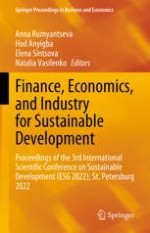This volume presents the proceedings of the 3rd International Scientific Conference on Sustainable Development (ESG 2022), St. Petersburg 2022. It discusses strategic approaches and relevant decisions of business, government, and civil society to achieve the Sustainable Development Goals (SDG), which were adopted by all UN member states in 2015. At present, the economies of different countries are in a zone of turbulence and the current agenda pushes the transformation of all customary systems to maintain and keep the achieved positions. The need to implement the agenda of sustainable development and achieve the SDGs is implemented through the socio-economic development strategies of countries with low greenhouse gas emissions, opportunities for green and transitional projects are considered, the issue of disclosure of non-financial reporting is widely studied, which can provide additional signal to business about the framework of sustainability in a changing world, as well as prospects for implementation of social and managerial business initiatives within the SDGs.
The economies of various countries are currently in a zone of turbulence, and the current agenda is pushing for the transformation of all customary systems to maintain and sustain the positions achieved. The need to implement the sustainable development agenda and achieve the SDGs is being realized through the socio-economic development strategies of countries with low greenhouse gas emissions, opportunities for green and transitional projects are being considered, non-financial reporting disclosure is being widely studied, which can provide an additional signal to business about the sustainability framework in a changing world, and prospects for social and managerial business initiatives under the SDGs.
This volume brings together material on sustainable development in economics and finance as well as industry. It is intended for scholars and professionals involved in public and corporate finance, financial accounting and auditing, sustainable development risk management, as well as economic growth, macroeconomics, monetary policy in a sustainable development environment, public and corporate governance and economics, corporate communications and public relations.
